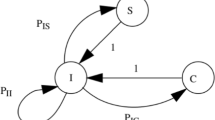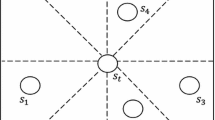Abstract
In wireless networks, reducing the number of redundant packets is one of the important mechanisms to minimize the required network bandwidth and the power consumed by network nodes. In this paper, an efficient and stateless flooding mechanism for anycast routing in wireless mobile ad hoc networks is proposed. The mechanism uses the technique of expanding ring search to decrease the related message traffic. A model of this mechanism is described. Based on this model, an extensive simulation study, together with real field experiments, has been conducted to investigate the performance of the proposed mechanism for anycast server localization. The simulation model has been developed in terms of a class of extended Petri nets that provide the possibility to conveniently represent parallelism of events and processes in the network. In simulation and real work experiments, fundamental performance metrics—response ratio, relative traffic and average response time—were investigated with varying distance of transmission and different combinations of model parameters. The obtained results show that the proposed approach to server localization in mobile ad hoc networks has good characteristics. As was demonstrated with a prototype system, the proposed routing method can be easily implemented at the application layer, without any changes at lower layers of the network protocol stack.







Similar content being viewed by others
References
Obrachzka, K., & Viswanath, K. (2001). Flooding for reliable multicast in multi-hop ad hoc networks. Wireless Networks, 7, 627–634.
Johnson, D. B., & Maltz, D. A. (1996). Dynamic source routing in ad hoc wireless networks. Mobile Computing, 353, 153–181.
Perkins, C. E., Royer, E. M., & Das, S. (2003). Ad hoc on-demand distance vector (AODV) routing. IETF RFC 3561.
Lim, H., & Kim, C. (2001). Flooding in wireless ad hoc networks. Computer Communication Journal, 24(3–4), 353–363.
Qayyum, A., Viennot, L., & Laouiti, A. (2002). Multipoint relaying for flooding broadcast message in mobile wireless networks. In Proceedings of the Hawaii international conference system sciences’35 (pp. 3866–3875).
Lou, W., & Wu, J. (2002). On reducing broadcast redundancy in ad hoc wireless networks. IEEE Transaction on Mobile Computing, 1(2), 111–122.
Liu, X., Jia, X., Liu, H., & Feng, L. (2007). A location aided flooding protocol for wireless ad hoc networks. In Mobile ad-hoc and sensor networks lecture notes in computer science (Vol. 4864, pp. 302–313).
Kum, D. W., Le, A. N., Cho, Y. Z., Toh, C. K., & Lee, I. S. (2010). An efficient on-demand routing approach with directional flooding for wireless mesh networks. Journal of Communications and Networks, 2(1), 67–73.
Lenders, V. (2006). Field-based routing and its application to wireless ad hoc networks. Ph.D. dissertation, Swiss Federal Insttitue of Technology Zurich.
Baumann, R., Heimlicher, S., & Plattner, B. (2008). Routing in large-scale wireless mesh networks using temperature fields. IEEE Network, 22(1), 25–31.
Reina, D. G., Toral, S. L., Jonhson, P., & Barrero, F. (2013). Hybrid flooding scheme for mobile ad hoc networks. IEEE Communications Letters, 17(3), 592–595.
Yen, Y. S., Chao, H. C., Chang, R. S., & Vasilakos, A. (2011). Flooding-limited and multi-constrained QoS multicast routing based on the genetic algorithm for MANETs. Mathematical and Computer Modelling, 53(11–12), 2238–2250.
Wang, J., Zheng, Y., & Jia, W. (2003). An AODV-based anycast protocol in mobile ad hoc networks. In IEEE international Symposium personal, indoor and mobile radio communications (pp. 221–225). Beijing, China.
Wu, J. (2005). On-demand anycast routing in mobile ad hoc networks. Mobile Ad hoc and Sensor Networks, LNSN, 3794, 93–102.
Wang, J., Zheng, Y., Jia, W. (2003). A-DSR: A DSR-based anycast protocol for IPv6 flow in mobile ad hoc networks. In IEEE vehicler technology conference (Vol. 5, pp. 3094–3098). Orlando, FL.
Peng, G., Yang, J., & Gao, C. (2004). ARDSR: An anycast routing protocol for mobile ad hoc networks. In Symposium on emerging technologied of IEEE on mobile and wireless communication (pp. 505–508).
Xu, X., Gu, Y., Du, J., & Qian, H. (2009). A distributed k-anycast routing protocol based on mobile agents. In 5th International conference on wireless communications, networking and mobile computing, WiCom ‘09 (pp. 1–4).
Lenders, V., May, M., & Plattner, B. (2008). Density-based anycast: A robust routing strategy for wireless ad hoc networks. IEEE/ACM Transactions on Networking, 16(4), 852–863.
Macuha, M., & Sato, T. (2009). Route-count based anycast routing in wireless ad hoc networks. In IEEE 70th vehicular technology conference, VTC 2009-Fall (pp. 1–5).
Ohta, S., & Toda, S. (2012). Anycast routing based on connectivity metric for sensor and ad hoc networks. In 9th International conference on ubiquitous intelligence and computing and 9th international conference on autonomic and trusted computing (pp. 56–63).
Ohta, S., & Makita, H. (2013). Anycast routing based on the node degree for ad hoc and sensor networks, In IEEE 16th international conference on computational science and engineering (pp. 439–446).
Yu, J., Lin, Y., Zhang, L., & Zhou, X. (2010). Ant-based multi-constrained anycast algorithm for ad hoc networks, In 2010 International conference on communications and mobile computing (pp. 249–253).
Budyal, V., Manvi, S. S., & Hiremath, S. G. (2013). Agent driven multi-constrained quality of service anycast routing in mobile ad hoc networks. In International conference on information networking, ICOIN 2013 (pp. 391–396).
Basarkod, P. I., & Manvi, S. S. (2014). Node movement stability and congestion aware anycast routing in mobile ad hoc networks. In IEEE international advance computing conference (IACC) (pp. 124–131).
Zhou, J. (2005). An anycast-based geocasting protocol for mobile ad hoc networks. In Parallel and distributed processing and applications lecture notes in computer science (Vol. 3758, pp. 915–926).
Budyal, V. R., & Manvi, S. S. (2014). ANFIS and agent based bandwidth and delay aware anycast routing in mobile ad hoc networks. Journal of Network and Computer Applications, 39, 140–151.
Zeng, Y., Xiang, K., Li, D., & Vasilakos, A. (2013). Directional routing and scheduling for green vehicular delay tolerant networks. Wireless Networks, 19(2), 161–173.
Vasilakos, A., Zhang, Y., & Spyropoulos, T. (2012). Protocols and applications: Delay tolerant networks. Boca Raton, FL: CRC Press.
Xiang, L., Luo, J., & Vasilakos, A. (2011). Compressed data aggregation for energy efficient wireless sensor networks. In SECON 2011 (pp. 46–54).
Wang, X., Vasilakos, A., Chen, M., Liu, Y., & Kwon, T. T. (2012). A survey of green mobile networks: Opportunities and challenges. Mobile Networks and Applications, 17(1), 4–20.
Li, P., Guo, S., Yu, S., & Vasilakos, A. (2012). CodePipe: An opportunistic feeding and routing protocol for reliable multicast with pipelined network coding. In INFOCOM 2012, pp. 100–108.
Cheng, H., Xiong, N., Vasilakos, A., Yang, L. T., Chen, G., & Zhuang, X. (2012). Nodes organization for channel assignment with topology preservation in multi-radio wireless mesh networks. Ad Hoc Networks, 10(5), 760–773.
Youssef, M., Ibrahim, M., Abdelatif, M., Chen, L., & Vasilakos, A. (2014). Routing metrics of cognitive radio networks: A survey. IEEE Communications Surveys and Tutorials, 16(1), 92–109.
Demestichas, P. P., Stavroulaki, G. V., Papadopoulou, I. L., Vasilakos, A., & Theologou, M. E. (2004). Service configuration and traffic distribution in composite radio environments. IEEE Transactions on Systems, Man, and Cybernetics, Part C, 34(1), 69–81.
Shen, Z., Luo, J., Zimmermann, R., & Vasilakos, A. (2011). Peer-to-peer media streaming: Insights and new developments. Proceedings of the IEEE, 99(12), 2089–2109.
Khan, M. A., Tembine, H., & Vasilakos, A. (2012). Game dynamics and cost of learning in heterogeneous 4G networks. IEEE Journal on Selected Areas in Communications, 30(1), 198–213.
Kostin, A., & Ilushechkina, L. (2010). Modeling and simulation of distributed systems. New Jersey: World Scientific C.
Kostin, A., Oz, G., & Haci, H. (2009). Performance study of a wireless mobile ad hoc network with orientation-dependent inter-node communication links. In Proceedings of 24th ISCIS (pp. 326–331).
Kostin, A., Oz, G., & Haci, H. (2014). Performance study of a wireless mobile ad hoc network with orientation-dependent inter-node communication scheme. International Journal of Communication Systems, 27, 322–340.
Kostin, A. (2010). Probability distribution of distance between pairs of nearest stations in a wireless network. Electronics Letters, 46(18), 1299–1300.
Oz, G. & Ozen, Y. (2009). Experimental investigation of data transmission in wireless ad hoc networks. In 5th International conference on soft computing, computing with words and perceptions in system analysis, decision and control (ICSCCW2009) (pp. 1–4). Gazimagusa, Northern Cyprus.
Azizi, R., & Oz, G. (2011). Performance evaluation of data dissemination in real-world ad hoc networks. In International conference on communications and information technology (ICCIT2011) (pp. 187–190). Agaba.
Abed, A. K., & Oz, G. (2013). Experimental study of pure flooding method for localizing an anycast server in wireless ad hoc networks. In Palestinian international conference on information and communication technology (PICICT’2013) (pp. 83–89). Gaza.
Author information
Authors and Affiliations
Corresponding author
Rights and permissions
About this article
Cite this article
Kostin, A., Oz, G. & Haci, H. A restricted flooding mechanism for efficient anycast server localization in MANETs. Wireless Netw 21, 1603–1612 (2015). https://doi.org/10.1007/s11276-014-0872-1
Published:
Issue Date:
DOI: https://doi.org/10.1007/s11276-014-0872-1




